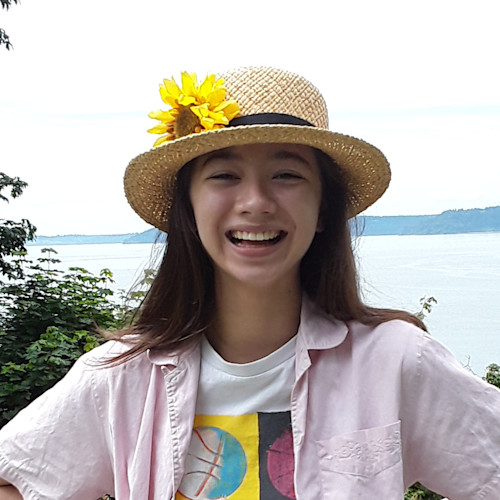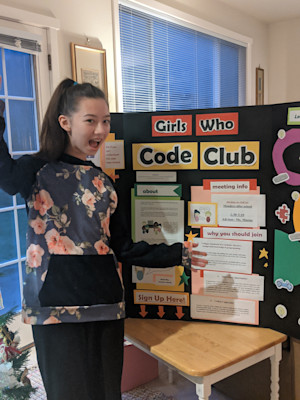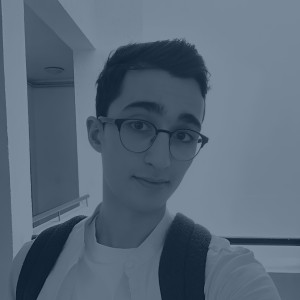Catherine Rasgaitis, 17

Catherine grew up having multiple interests related to creative arts. At age 10, her parents enrolled her in several summer camps in her hometown of Tacoma, WA. Catherine found herself playing basketball and learning storytelling, but she felt most excited when she discovered Clubhouse 253, a computer science summer camp teaching Kodu Game Lab and Scratch.
Catherine left the camp excited to keep building with Scratch, continuing her work on “choose your own adventure” games and custom platformers until her games received the ultimate recognition: being featured in a curated collection on the official Scratch website. Finding her passion, Catherine continued coding, eventually enrolling in her high school’s Web Design class. There she found herself one of two girls in a class of twenty. Inspired by the demographic gap in her class, she says, “I quickly made it my mission to debunk misconceptions about technology being a ‘man’s industry.’”
This realization led Catherine to start her high school’s first Girls Who Code Club. There she works to encourage and empower the club’s members and help them pursue their interests, often devoting herself to learning in-demand coding skills first so she can teach them to the entire club.
As she was watching tutorials on HTML, CSS, and JavaScript to expand her coding skill set, one of the videos recommended coders attend a hackathon to test their skills and help others. So, in the summer of 2020, Catherine participated in her first hackathon: TaroHacks. She quickly realized how welcoming, fun, and supportive this community is. She joined forces with another hacker to build her first project, a website named School Tools meant to help its users find educational resources and record to-do lists. Her journey grew from there; today, she’s participated in over sixty hackathons.
Wanting to share the knowledge and experience she gained at these events with other coders, she now volunteers as a mentor at the student-operated computer-science non-profit CodefyCS.
She’s also used hackathons to address challenges in her own life. When her grandmother was diagnosed with Alzheimer's disease, Catherine said: “I was devastated. I knew I had a small window of time before the disease would strip her of her bright personality and our shared, cherished memories. I knew I had to do something to help.”
Determined to find a solution, she turned to technology. Catherine collaborated with her MLH teammates to participate in Tech Takes on Mental Health, a hackathon that focuses on cognitive science. She and her team created NeuroBoost, an app that is simple to use but effectively designed to help patients living with Alzheimer's improve their cognitive skills and continue to recognize faces. While most hacks don’t continue past the hackathon, her grandma’s caregiver started using NeuroBoost with great results. Catherine recalls, “I was overjoyed when my grandma could recognize me more consistently."
For Catherine, she says, “participating in hackathons has not only improved my technical skill set, but it has given me the ability to give back, share my passions, and build projects that truly help people.”
Quick Facts

Catherine Rasgaitis, 17

Catherine grew up having multiple interests related to creative arts. At age 10, her parents enrolled her in several summer camps in her hometown of Tacoma, WA. Catherine found herself playing basketball and learning storytelling, but she felt most excited when she discovered Clubhouse 253, a computer science summer camp teaching Kodu Game Lab and Scratch.
Catherine left the camp excited to keep building with Scratch, continuing her work on “choose your own adventure” games and custom platformers until her games received the ultimate recognition: being featured in a curated collection on the official Scratch website. Finding her passion, Catherine continued coding, eventually enrolling in her high school’s Web Design class. There she found herself one of two girls in a class of twenty. Inspired by the demographic gap in her class, she says, “I quickly made it my mission to debunk misconceptions about technology being a ‘man’s industry.’”
This realization led Catherine to start her high school’s first Girls Who Code Club. There she works to encourage and empower the club’s members and help them pursue their interests, often devoting herself to learning in-demand coding skills first so she can teach them to the entire club.
As she was watching tutorials on HTML, CSS, and JavaScript to expand her coding skill set, one of the videos recommended coders attend a hackathon to test their skills and help others. So, in the summer of 2020, Catherine participated in her first hackathon: TaroHacks. She quickly realized how welcoming, fun, and supportive this community is. She joined forces with another hacker to build her first project, a website named School Tools meant to help its users find educational resources and record to-do lists. Her journey grew from there; today, she’s participated in over sixty hackathons.
Wanting to share the knowledge and experience she gained at these events with other coders, she now volunteers as a mentor at the student-operated computer-science non-profit CodefyCS.
She’s also used hackathons to address challenges in her own life. When her grandmother was diagnosed with Alzheimer's disease, Catherine said: “I was devastated. I knew I had a small window of time before the disease would strip her of her bright personality and our shared, cherished memories. I knew I had to do something to help.”
Determined to find a solution, she turned to technology. Catherine collaborated with her MLH teammates to participate in Tech Takes on Mental Health, a hackathon that focuses on cognitive science. She and her team created NeuroBoost, an app that is simple to use but effectively designed to help patients living with Alzheimer's improve their cognitive skills and continue to recognize faces. While most hacks don’t continue past the hackathon, her grandma’s caregiver started using NeuroBoost with great results. Catherine recalls, “I was overjoyed when my grandma could recognize me more consistently."
For Catherine, she says, “participating in hackathons has not only improved my technical skill set, but it has given me the ability to give back, share my passions, and build projects that truly help people.”
Quick Facts




